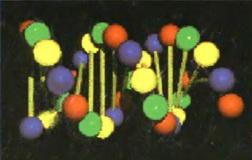By Clinical Genetics established that a lot of chronic diseases - a manifestation of the "genetic load", inherited from parents and other ancestors or acquired under the influence of the external environment. Sometimes this "load" can lead to infertility, spontaneous abortion, birth defects and mental weakness.
What can you learn with the help of molecular genetics?
- How to optimize nutrition, whether there is health risk associated with the professional activity, far as for you personally dangerous smoking and excessive alcohol consumption, what by intensity and type of physical activities you need.
- Find out, does whether not threatens diabetes for you and neurological disorders of old age;
- Assess the risk of congenital diseases in planned children;
- Minimize the threat of the normal development of the fetus during pregnancy.
Tips for parents
Waiting for a child, all parents worry - whether all will be normal. In most cases, these fears are groundless. But better to exclude risks, passing medical genetic study if:
• Women was treated for infertility a long time, her age more than 35 years;
• There were cases of miscarriages;
• At somebody of the relatives from her husband or wife already have children with mental retardation (Down syndrome), malformations (for example spina bifida, anecephalia, omphalocele), various hereditary diseases (cystic fibrosis, Tay-Sachs, and others.);
• If one spouse has a serious hereditary disease.
How is goes the molecular genetic studies?
- To conduct genetic testing in a special test tube is taken venous blood, taken on an empty stomach.
- Doctor-geneticist analyzes the received information, estimates the amount of the risk of diseases and develops recommendations to the patient, containing the program of prevention, treatment and diagnostic of measures aimed at minimizing identified risks.
- If the doctor identifies number of risks, it is - a signal of the need take appropriate action and get rid of adverse external factors that increase the risk.
hide
 The main goal of Clinical Molecular Genetics - the study and review of variability and heredity in humans.The most important and significant moment in the study of Clinical Molecular Genetics is a gene DNA, or to be more precise, its mutation.
The main goal of Clinical Molecular Genetics - the study and review of variability and heredity in humans.The most important and significant moment in the study of Clinical Molecular Genetics is a gene DNA, or to be more precise, its mutation. 






